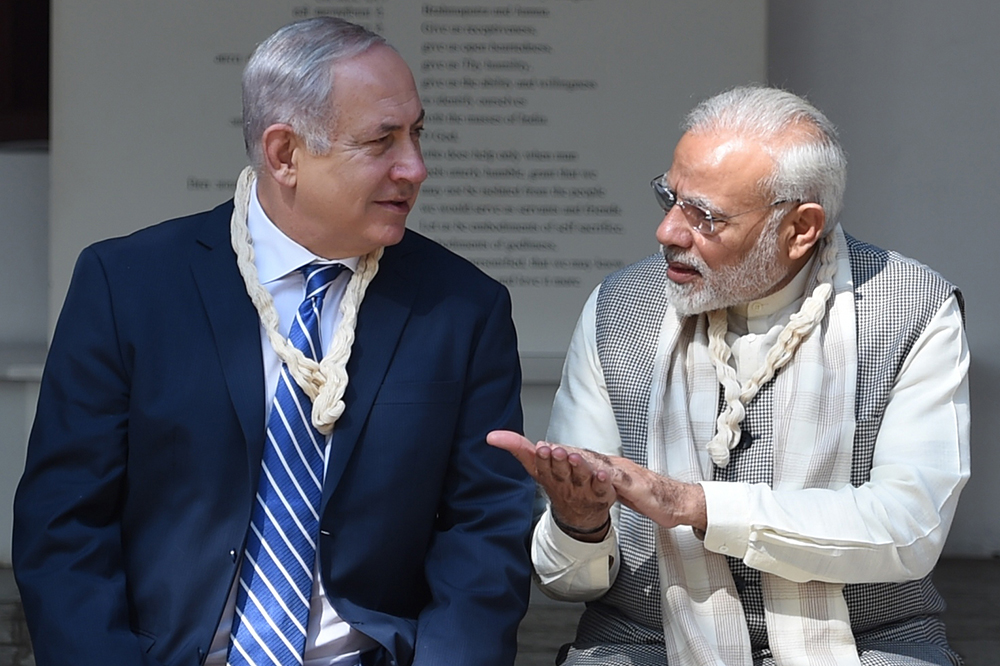Narendra Modi landed in Israel in the summer of 2017. His visit to the Jewish state, the first by an Indian prime minister, was historic. India, after all, was once considered, in the words of Bernard Weinraub, ‘the loneliest post in the world’ for Israeli diplomats. But by the 21st century, India had become Israel’s closest eastern partner and its largest arms market.
What precipitated this dramatic shift?
Having voted against the creation of Israel at the UN in 1947, India desisted from establishing full diplomatic relations with West Jerusalem until 1992. For decades, Israel’s presence in India was limited to an immigration office in Mumbai. In between, India voted with the majority to pass UN Resolution 3379, condemning Zionism as a form of racism, became one of the first non-Arab states to recognize Palestine’s declaration of independence in 1988, and was generally among the more vocal non-Arab voices against Israel.
Since 2001, however, the diasporas of the two countries have emerged as energetic allies against a shared enemy: Islamic extremism. A survey by the Israeli foreign ministry in 2009 found India to be the most pro-Israel country in the world, well above the US. Once a bastion of pro-Palestinian sentiment, India appeared at the bottom in a worldwide poll in 2011 of countries sympathetic to Palestinian statehood.
Israel had all along been a quiet friend to Delhi, volunteering clandestine support as India sought to repel attacks by China (in 1962) and Pakistan (in 1965). Israeli officials knew also that India, which had no traditions of anti-Semitism, had arrived at its Israel policy through a combination of post-colonial hauteur, realpolitik —particularly its desire to placate Arab Muslim opinion in its contest against Islamic Pakistan — and an ethical commitment to the Palestinian cause. Partly for these reasons, India’s anti-Israel sloganeering rarely provoked any anxiety in West Jerusalem.
A triad of reasons account for the revision of India’s attitude towards Israel. The first is the belated realization that no amount of deference to Arab sentiment could alter Muslim opinion in West Asia in India’s favor: when it came to Kashmir, Shia and Sunni united in supporting Pakistan’s position.
The second was the collapse of the old world order: the demise of the Soviet Union meant that India had to forge new partnerships.
The third cause of the intensification of Indo–Israeli ties is less well known: the rise of Hindutva in India. As the liberal Israeli newspaper Haaretz once phrased it, relations between Israel and India ‘tend to grow stronger when… India experiences a rightward shift in anti-Muslim public opinion or in leadership’.
For Hindu supremacists, Israel has always been something of a polestar: a nation to be revered for its ability to defeat, and survive among, hostile Muslims. In 2009, Mumbai’s anti-terror squad arrested, among others, an officer in the Indian Army, Prasad Purohit, for masterminding a terrorist attack on Pakistani citizens and plotting to overthrow the secular Indian state. In his confession, Purohit admitted to making plans to approach Israel for help.
The Hindu nationalist obsession with Israel was always enmeshed with the desire to terminate India’s support for Palestine. The Congress Party’s pro-Palestine stance — largely meaningless after 1992, when India established full diplomatic relationship with Israel — was impugned by the BJP as a sop to Indian Muslims. In truth, Indian Muslims have made noticeable efforts to build bridges with Israel. In 2007, for instance, Maulana Jamil Ilyasi, the leader of half a million imams of India, travelled to Israel to interact with ‘Jewish sisters and brothers’.
But the irony of Modi steering India closer to Israel has been lost on the pro-Modi Likudniks in Israel. The founding luminaries of Hindu nationalism were enamored of Hitler. Speaking for ‘sensible Hindus’ in 1939, a key ally of the RSS, the organizational mothership of Hindu nationalism, welcomed with ‘jubilant hope’ Germany’s ‘solemn idea of the revival of the Aryan culture, the glorification of the swastika, her patronage of Vedic learning, and the ardent championship of Indo-Germanic civilization’.
Reverence for Hitler has remained strong among Hindu nationalists. Social studies textbooks published in Gujarat when Modi was the state’s chief minister contained such chapters as Hitler the Supremo and Internal Achievements of Nazism, and students were taught that ‘Hitler lent dignity and prestige to the German government. He adopted the policy of opposition towards the Jewish people and advocated the supremacy of the German race’.
Is the liberal vision of Theodor Herzl, the founder of modern Zionism, disgraced or upheld when Modi, forged in an ideology that lionizes the tormentors of Herzl’s people, mouths platitudes about democracy with Netanyahu, an ethno-religious bigot?
This article is adapted from Kapil Komireddi’s Malevolent Republic: A Short History of the New India (Hurst).


















